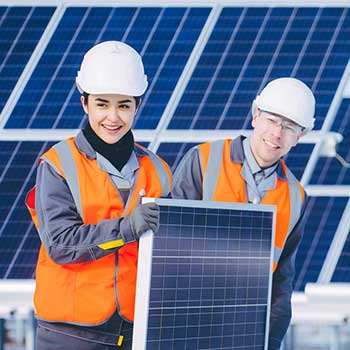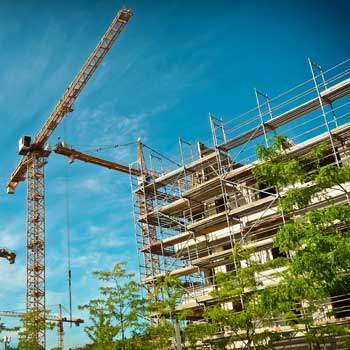
Do you care about the environment? Cool, me too! I care about the impact we have on the environment and want to work toward turning around the damage that has been done. Are you in?
As Gen X, millennials and Gen Z enter the workforce, we are bringing new values, ideals and knowledge to the industries we serve. By bringing new ideas to our industries, we are promoting the future we want to see and enacting change in the world. We see it as the media starts to promote diversity and celebrate differences.
In the construction world, we are seeing the industry turn to sustainable methods that help promote environmentally conscious efforts.
The younger generations are already finding their place within the industry. With 40% of the workforce retiring by 2030, they are going to have the opportunity to control the industry. As they have already begun making their way into the field, construction companies have seen a shift toward more sustainable practices. As the new generations place an importance on improving the state of the earth, companies have seen sustainable changes such as: reducing waste on a site, producing energy efficient buildings or constructing wind turbines — the industry has started moving toward sustainability.
According to a survey of Fortune 500 companies, millennials are coming to the forefront and leading social change movements, especially within their careers. Millennials are known for wanting to make a difference and trying to find purpose in what they do. The desire to do something meaningful leads them to make conscious decisions to make a difference through their career, volunteer efforts or monetary donations. As saving the environment and sustainability becomes more important to the younger generations, they are pursuing careers that deal with sustainability and environmental studies.
As these generations wish to change the future on earth, they are succeeding. By promoting sustainable efforts in the industry, construction companies have begun to care about environmental protection. As this practice grows and becomes normalized, the industry will be making an environmental difference for generations to come.

Gen Z students who have graduated high school are starting to enter the workforce or pursue secondary schooling. As they do so, they are pursuing environmental careers more than ever before. Even still, the career field is expected to continue to grow.
For students pursuing these careers in college, the number one environmental studies degree is in environmental architecture and environmental design. This major teaches students how to design homes, factories, offices and other commercial buildings with sustainable design and energy efficiency. Essentially, getting students ready to work in a green construction industry.
As the degree rises in popularity and as these professionals enter the workforce, we are going to see an increase in green building projects. With these green professionals contributing to the industry and providing insight into how to turn projects green, the industry will have a better understanding of how to function sustainably.
As industry professionals look for architects and designers to hire for their firm, they will see an increase in craft professionals with a focus on sustainability. By hiring these professionals, any construction company can start having a green focus.
It is also important to note that as the industry focuses more on sustainability it will attract a new cohort of professionals to join the field. Experts in sustainability and environmental protection will drive a new labor market to the field – young people who care about the environment.
As stated, younger generations care about the environment and want to actively help protect it. By putting a focus on sustainability, the industry will draw new professionals to the field who want to help make a sustainable future.
While there might be some resistance to this trend, new studies show that green construction helps the industry to adapt to growing demands. When Gen X and millennials start buying houses or contracting projects with the construction industry, they will likely exclusively work with companies that operate sustainably. By working with a company that produces green projects, the younger generation can ensure that they are doing their part to help protect the environment, which proves to be important for them. By predicting these trends and starting to work toward a green future, the industry will be able to adapt to this trend.
Essentially, as these generations refuse to invest in projects that will produce excess waste or won’t function efficiently, there will be a decrease in these practices. By creating a demand for green projects, the industry has to respond and meet these demands.
Chances are you’re operating under the assumption that green projects are more expensive to build. However, this is not true. The difference in cost between green projects and standard projects is minuscule, with the main price difference occurring during the planning stage. Though an investment may be necessary during planning, companies can make more money from green projects as they can add 17% to the cost of a building. By adding a nearly 20% increase to the price of projects, the industry can thrive under a sustainable motive.
By creating projects that are energy efficient, the buyer will be saving money in the long run. Therefore, they will be willing to pay more upfront. By increasing project costs, the industry will be able to make more money off of green builds which will further help motivate sustainable practices.
The switch to green is coming. In fact, it is already here. Companies have begun to work on sustainable, energy efficient projects that help the environment now and in the long run. In a survey of construction companies, nearly half of survey respondents expect that the majority of their projects in the next three years will be green buildings.
Gen X, millennials and Gen Z, who care about the environment and the footprint they leave, are increasingly demanding green projects — the industry has to listen.
Luckily, environmental studies and sustainability professionals are increasingly entering the construction workforce and guiding the industry toward a greener future.